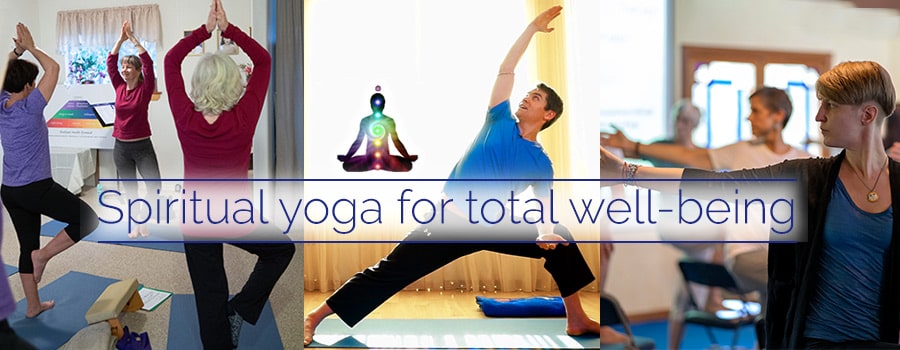Insights into Truthfulness
The Study of Satya
Teaching yoga is such a wonderful way to deepen the understanding that we are all divine.
One way I’ve come to see this more and more is through teaching three sections of a 15-week, three-credit yoga class at Frederick Community College in Frederick, Maryland. I’d like to share with you some of the inspiration that I’ve felt in doing this.
But first, a bit about the course: Each class is two-and-a-half hours long: about an hour of lecture and/or group discussion, followed by 90 minutes of asana, pranayama, and meditation. In addition to some aspect of asana, each lecture/discussion covers some broader aspect of yoga.
For the first three weeks we explore the meaning of yoga, the breath, and the concept of balancing the “ha” and “tha” elements in one’s yoga practice and life. Then, after an introduction to the Yoga Sutras, for each of the next ten weeks we look at one of the ten yamas and niyamas, in order. Later on in the course we delve into such topics as meditation, mudras, affirmations, yogic diet, and the chakras.
I try to provide something for everyone, knowing that I might not please all the people all the time, but asking them to be willing to try something new. I like to open doors to new subjects, and point the students more deeply in that direction if they want to find out more. There is usually some way to spark even the most walled-off person. I try not to push anything on anyone, but to create an atmosphere of openness, acceptance, and non-competitiveness.
As part of this process, each week I also assign some reading (one of the texts is Swami Kriyananda’s Ananda Yoga for Higher Awareness) and ask students to journal responses to questions that I give them. The questions are intended to help them think about how to apply in their lives what we learned in class.
Quite early in the course, students begin to write about the many ways they are doing this: daily asana practices, meditating, using affirmations, utilizing pranayama in their lives, the power of the breath, and coping with life differently through insights that the yoga teachings have offered them.
I feel that, as people begin to explore yoga more, they begin also to believe more in themselves. Even young men in their 20’s, usually concerned with having a tough image, have written in their journals about how great affirmations are, and how they are using them often now, when they thought they were kind of goofy in the beginning. Now that’s certainly a different kind of strength than being a “tough guy”!
I’m so thankful for all that I continue to learn from Ananda Yoga Teacher Training. I greatly enjoy reading the students’ journals, and I learn so much from them. Most students are in their late teens or early twenties (with the occasional older returning student), but whatever their age, background, or lifestyle, reading their words each week is an ever-deepening reminder that we are all divine.
The Study of Satya
To illustrate this, I’d like to share with you part of our study of the yamas and niyamas. I was very inspired when I learned about these principles in Ananda Yoga Teacher Training, and I feel it’s important to pass them along whenever possible. I emphasize that the yamas and niyamas are not about “going to hell” if one does not practice these things; they are just a guide that can take one into deeper places of peace, joy, and union — yoga, if that is where they decide they want to go. I tell them not to take my word for it, but to give these things a try and see what happens!
For most of the journal questions about the yamas and niyamas, I include a quote from a book or lecture for students to comment on. I’ve recently read about fifty papers on satya (truthfulness), a yama that I’ve found students get very passionate about! I was very struck by their creativity and insights on satya, and I’d like to share some of that with you.
Here are the journal questions that I had assigned:
- What does truthfulness mean to you?
- What are your strengths and challenges with truthfulness?
- How might you be more truthful with yourself?
- Have you lived with an untruth? If so, how does (or has) that affect(ed) you? How do you feel you can most effectively handle this situation, also with the spirit of non-violence? [We had studied ahimsa the week before.]
- “Truthfulness doesn’t mean that you have to put it all out there. It means that you are moving from your own heart.” (Uma Macfarlane, lecture at The Expanding Light Retreat, February 2000). What does this mean to you?
- How do you live in accordance with your heart and soul’s deepest desires? How do you find that you work with these dreams, and harmoniously blend them with social realities, obligations, or where you are now in your life?
Responses to Uma’s Quote
While reading these papers on satya, I was particularly struck by how students responded to the quote by Uma:
“Truthfulness doesn’t mean that you have to put it all out there. It means that you are moving from your own heart.” Here is what those words meant to some of my students:
- “Truthfulness doesn’t necessarily mean a verbal communication. It also deals with the heart. Our heart must be accepting in order for truth to be permitted.”
- “People are like multi-layered roses. Truthfulness allows us to peel off some petals, helping us to deal more directly with what is important.”
- “This passage means to me that you don’t have to tell the whole world the truth, you only have to make it right with yourself. You may only need to tell one other person the truth. You may need to tell a whole group of people. You have to do what is right in your own heart.”
- “There is no set formula for what is truth or life; you have to let your heart decide.”
- “I agree that it doesn’t mean that you have to put everything out in the open air. I also believe that you must be truthful with yourself before you can be with anyone else, so following and moving from your own heart is essential to being a truthful person.”
- “I guess I need to keep in mind that intention is the most important part of truthfulness. If I lie to deceive someone, then this will damage my heart. If I keep quiet about something to protect someone I love, then my intentions are good and I can feel more peaceful about that.”
- “In a nutshell, ‘What is my intention?’ I am coming to believe that all of my life should be judged on the question, ‘What is my intention?’”
- “To me the quote means that while it is important to be truthful, you don’t have to reveal all of your thoughts, opinions, and personal information. Sometimes it is not necessary to reveal all of yourself to still be honest.”
- “I believe everyone should live by this. Being true to your heart is the only way to be truthfully happy.”
- “Truth is a way of life. When you have become one with it completely, all of your actions are an expression of a genuine compassion that springs from your heart.”
- “It is most important to be truthful to yourself. Only you know what is really true in your life, and it is up to you to accept this.
- “I think it means that you are coming to accept things in your heart and moving from your heart, away from your worries.
A Second Look
I began to wonder, “What did you mean by those words, Uma?” As I pondered this, I felt inspired to look in Affirmations for Self-Healing, by Swami Kriyananda, and I found these words that feel relevant:
“Truthfulness is not caustic statements of unpleasant facts and unflattering opinions. Such statements are usually born of pride. But truthfulness is the effort always to see the divine truth behind appearances. It is the effort to express always that aspect of truth which may prove the most beneficial.”
Now I was really getting into this, so I decided to ask Uma to elaborate on her statement. Here is her response:
“Truthfulness, as with most spiritual truths, has both obvious and subtle meanings. Jesus Christ said to look at the letter and the spirit of the law (in this case, the law of truthfulness). When we think of truthfulness, we immediately think of not lying: we must speak the truth. This is the letter of the law of truthfulness.
“How this plays out for us in real life however, can be much trickier than it appears. For instance, if I see someone who I think is not very attractive, in dress, in personality etc., should I tell the truth and say so? This would be speaking the truth, wouldn’t it? Or would it?
“All spiritual precepts are designed to lead us away from self-involvement and isolation, into the oneness of spirit. Spirit has been described through the ages as joy, peace, love, and unity — these states, when experienced, create a sense of connection and compassion. With this understanding, to speak the truth merely because I want to is not the point.
“Clearly, the purpose of truthfulness is to compel us to search our own hearts to find what is motivating our thoughts and behavior. Are you motivated by anger, fear, or simply a mood? Are these reactions based in reality? Are they true? In other words, you may have a fear of heights, but heights themselves are not set on making you afraid. To reach beyond your own perspective, and include another point of view, is the purpose of truthfulness.
“Instead of feeling, ‘I should be able to speak my truth,’ question the relevance and impact of what you want to say, before you say it. Sometimes it really is more truthful to say nothing at all. This is the spirit of the law of truthfulness.”
More Truth about Truthfulness
It’s amazing how many layers and shades of meaning this principle can have. Here are some additional gems from students’ journals:
- “Truthfulness, to me, is reflected in complete honesty in interaction. Since the tests of truthfulness come during each interaction with another person/the world, it seems that the relationships one has with other people are indicators of a true or deceitful inner nature. If you are a different person from one hour to the next, depending on who is around you, in an attempt to lie to the external world, you end up lying only to yourself. If you act from a centered place, beyond ego, with equanimity at your core, the correct action and speech in all circumstances will be known intuitively.”
- “To me, truthfulness means expressing actual reality, whether to yourself or others. Truthfulness is also having the courage to accept what is real.”
- “If one does not truly forgive, but says that he does, then the forgiveness is invalid; it becomes an untruth.”
- “For me it is hard to be truthful with myself when I judge myself harshly based on what society imposes upon women. I often want to be something I am not, and although I know it is unreasonable, I fall into the trap.”
- “It is my opinion the people who live with lies probably worry about the truth coming out. It seems as though it would be a huge stress on the mind and body.”
- “Having had many confrontations with dishonesty, it has been made evident (after much thought) that the only reason anyone lies is to attempt to control the events of the outside world, due to the mistaken conception of something being ‘wrong’ with himself.”
- “To me truthfulness means being honest with yourself and those around you, and accepting the truth when it is given to you. It is important to me in that I want people to be honest with me and I will give it equally, but usually only when asked for it, because not everyone wants to hear it. When I ask someone to answer a question honestly, I do my best to accept and think about what he or she says, and not get angry. I asked for honesty, and there is a responsibility in that.”
- “I don’t like to come across as ‘phony’ to my children, and if I do, they call me on it, which is exactly what I want them to do. The most basic truth is Love — it is being connected to all else. The most basic untruth is fear, which is being completely separated from all else. “Therefore truth is always bringing us together, to learn to revere all living things. This level of respect is hard to adapt to, when we are used to putting everything ‘in a box.’ This categorization process requires judgment. I was taught to be judgmental to protect myself, but now I realize that self-defense is a form of attack. Sometimes I go round and round with this. My goal is to keep my energy flowing so that it doesn’t become knotted up. … “When you live an untruth, your energy becomes stifled and doesn’t flow well. I tell my sons that energy continually flows — one way or another. If we don’t release it by being honest with ourselves, it can manifest itself in other ways such as physical or mental ailments.”
Wow! I’m so grateful for this opportunity to learn from others.
God Is Reminding God
After quoting so many others, I began to wonder, “Do I have something to say about satya, based upon my own reflections and meditations?”
I thought for awhile, but nothing came. Then I remembered my original inspiration for writing down all my students’ observations on truthfulness: the wisdom they had shown had in turn reminded me of the higher truth that God resides within each one of us. I remind myself often of this truth, and it keeps sinking in deeper and deeper.
Interacting with people through teaching yoga is such a splendid opportunity to remember to see the divine within everyone. The more I remind others that God resides within them, the more they remind me, too. That works very nicely!
Related Articles
All authors are graduates of Ananda Yoga Teacher Training.





















